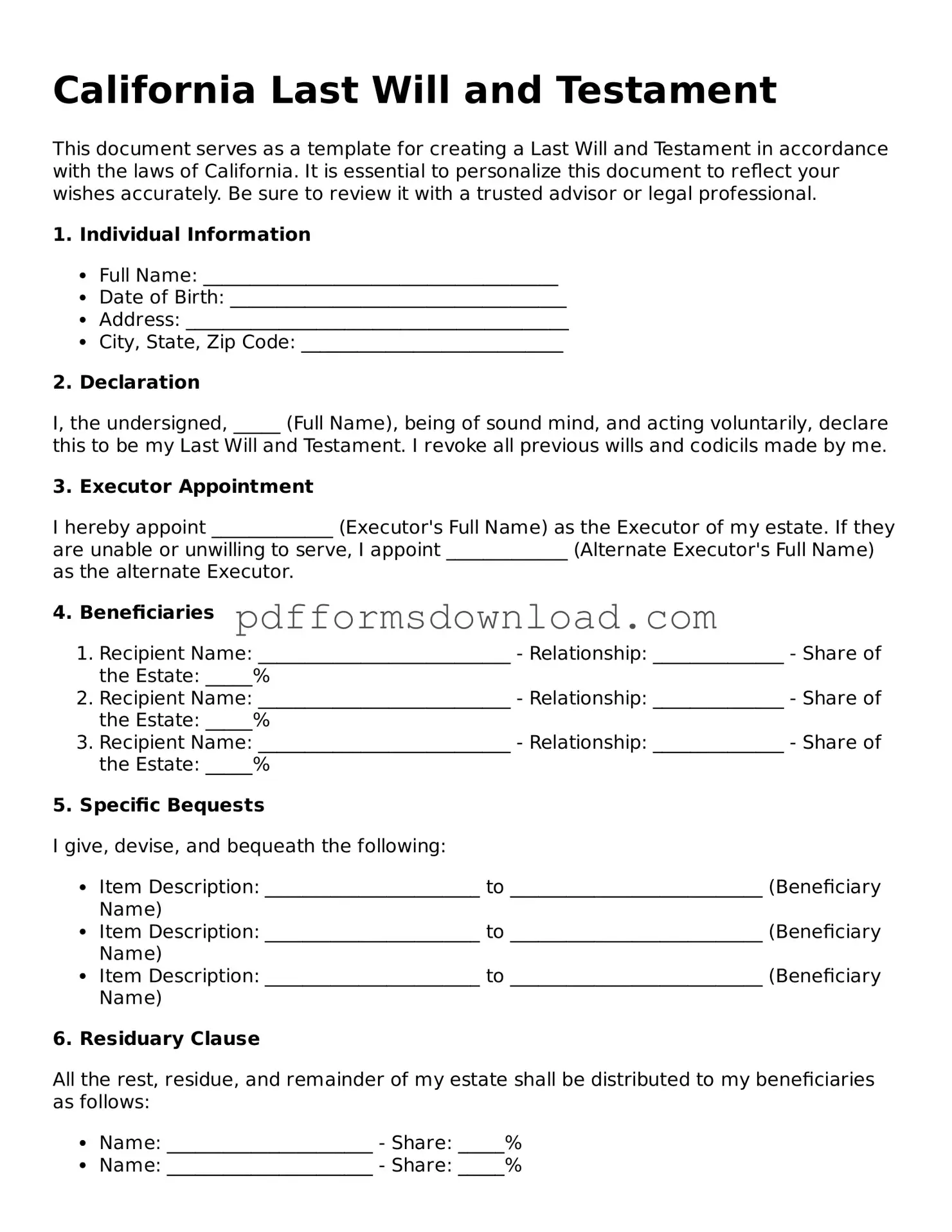What is a Last Will and Testament?
A Last Will and Testament is a legal document that outlines how an individual's assets and affairs should be handled after their death. It specifies who will inherit property, who will manage the estate, and can even designate guardians for minor children. This document ensures that your wishes are followed and can help avoid disputes among family members.
Do I need a lawyer to create a Last Will and Testament in California?
While it is not legally required to have a lawyer to create a Last Will and Testament in California, consulting with one can be beneficial. An attorney can help ensure that the will complies with state laws and that your wishes are clearly articulated. If your estate is simple, you may choose to use a template or online service, but professional guidance is recommended for complex situations.
What are the requirements for a valid will in California?
For a will to be valid in California, it must be in writing and signed by the person making the will (the testator). Additionally, it must be witnessed by at least two individuals who are present at the same time. These witnesses must also sign the will. California allows for handwritten (holographic) wills, but they must be signed and dated by the testator and contain the essential elements of a will.
Can I change my will after it has been created?
Yes, you can change your will at any time while you are still alive and mentally competent. Changes can be made by creating a new will or by adding a codicil, which is an amendment to the existing will. It is important to follow the same legal formalities when making changes to ensure that the modifications are valid.
What happens if I die without a will in California?
If you pass away without a will, your estate will be distributed according to California's intestacy laws. This means that your assets will be divided among your closest relatives, such as your spouse, children, or parents, based on a predetermined formula. Dying without a will can lead to outcomes that may not reflect your wishes, so having a will is highly advisable.
Can I disinherit someone in my will?
Yes, you can choose to disinherit someone in your will. However, it is important to clearly state your intentions in the document to avoid confusion or potential legal challenges. If you wish to disinherit a spouse or child, California law requires that you explicitly mention their name and state your intention to exclude them from inheritance.
How often should I update my will?
It is recommended to review and update your will every few years or after significant life events, such as marriage, divorce, the birth of a child, or the death of a beneficiary. Changes in financial circumstances or changes in relationships can also warrant an update. Keeping your will current ensures that it reflects your current wishes and circumstances.
What is a codicil, and how is it used?
A codicil is a legal document that modifies an existing will. It can add, change, or revoke specific provisions without the need to create an entirely new will. To be valid, a codicil must meet the same legal requirements as a will, including being signed and witnessed. Codicils can be useful for making minor adjustments without the need for a complete rewrite.
Is a handwritten will valid in California?
Yes, California recognizes handwritten wills, also known as holographic wills. For a handwritten will to be valid, it must be signed and dated by the testator. The essential terms regarding the distribution of assets must be in the testator's handwriting. While they are valid, handwritten wills can lead to disputes, so it is often advisable to have a formally drafted will.
What should I do with my will once it is completed?
Once your will is completed, it is important to store it in a safe place where it can be easily accessed after your death. Many individuals choose to keep their will in a safe deposit box, with an attorney, or in a secure location at home. Inform trusted family members or executors about the location of your will to ensure it can be found when needed.

